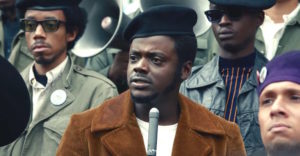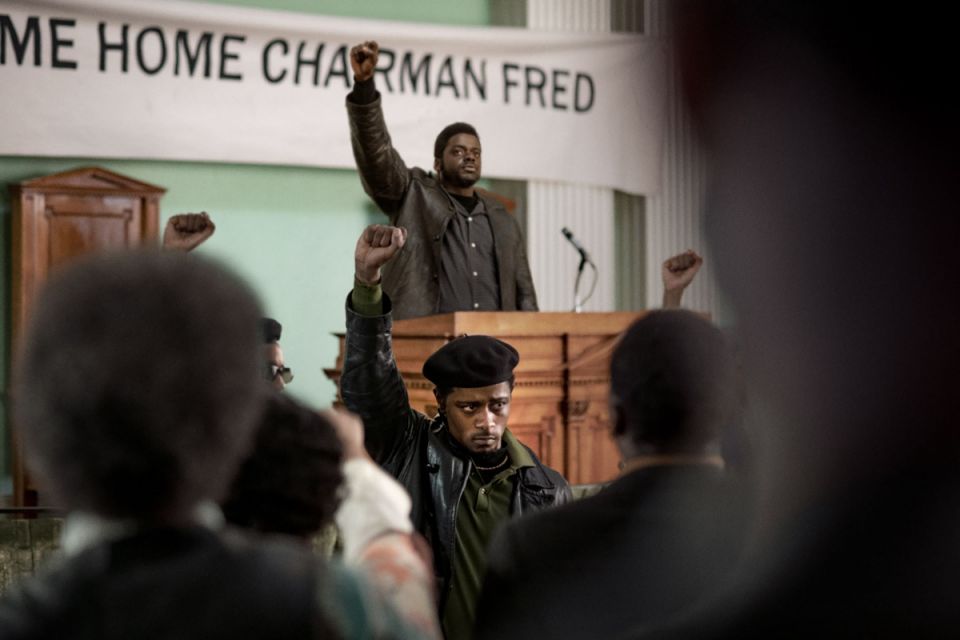Judas and The Black Messiah has become a cultural sensation, garnering significant critical praise and awards season recognition. The success of the film is merited; Shaka King’s writing and direction are superb, and Daniel Kaluuya, Lakeith Stanfield and Dominique Fishback all turn in outstanding performances as Fred Hampton, William O’Neal and Deborah Johnson, respectively. Above all, the film succeeds in accomplishing one of the most difficult tasks in narrative based media; it tells a compelling story that’s ending is well known, and when the conclusion arrives, no impact is lost.

All noteworthy aspects of the film aside, its success is something of a surprise. As Lawrence Ware of The New York Times notes, not since Spike Lee’s 1992 biopic, Malcolm X, has there been a major-studio backed film that so vigorously champions Black radicalism. When Hollywood chooses to tell true Black stories, they are most often only told in the context of whiteness. This is evident in which films The Academy deems most worthy. An analysis of Best Picture winners since the year 2000 in which the central topic was racism or the Black experience reveals that only four films have earned the golden statue: Crash (2004), 12 Years A Slave (2014), Moonlight (2016) and Green Book (2018). Of those four films, two had Black directors, and only Moonlight tells a Black story absent of white encroachment or appeasement. Moonlight, an excellent, groundbreaking film by any measure, did not attack the highest institutions of law enforcement in the United States, nor did it assert the political and cultural validity and value of an organization as radical, misunderstood and feared as the Black Panther Party. Academy Award nominations have not yet been revealed at the time of writing, but Judas and The Black Messiah is sure to garner some recognition, potentially placing it in a league of its own.
The film stands on its own achievements. It’s a proud testament to cultural progress made regarding recognizing Black heroes that do not conform to white appeasement, and the bravery of exposing the underwritten, often hidden history of the State’s effort to destroy pro-Black movements, J. Edgar Hoover’s FBI and its COINTELPRO operation that jailed or killed countless freedom fighters should be lauded. Still, one cannot help but be skeptical of just how radical art can be under the control of white dominated, hyper-capitalistic systems like Hollywood and its major studios. One of the few shortcomings of the film is its incomplete depiction of Fred Hampton and the BPP writ large. Part of this is due to the constraints of producing a commercial, studio-backed project; audiences are more likely to identify with a thriller than a biopic, necessitating historical and biographical reductions of Hampton and the BPP to make room for standard filmic and narrative liberties. King describes the difficulty of fully capturing Hampton in an interview with Variety; “It’s a Fred Hampton biopic inside of a crime-drama narrative, which is inside of a genre film. Give people a history lesson and entertain them.”
The necessity to entertain —allegiance to the bottom line— requires an unwillingness to alienate audiences, many of the faces in which are white. This is not to say white people are unwilling to see radical Black stories; the film has performed enormously well in its pandemic-limited theatrical run, as well as through Warner Brothers’ studio partnership with streaming service HBO Max. Still, the hurdles Shaka King and the production team behind Judas had to overcome were daunting, and the film’s success, and even production, was no guarantee. Speaking with Jelani Cobb of The New Yorker in a candid interview on the road to Judas and The Black Messiah’s release and acclaim, King bluntly details the financial realities of producing the film.
“You also have to take into account that if you’re talking about a bio-pic of someone like Fred Hampton, you’re talking about a period piece,” said King, breaking down the so-called “development hell” stagnation of the film’s production. “So, automatically, your minimum budget is probably going to be somewhere in the ten-to-fifteen-million-dollar range. And it’s a movie with set pieces, so you’re going to go up north of that. And once you go north of that, then you’re talking about, where’s the Louis Armstrong, Joe Louis, Rosa Parks? People who are iconic, across the globe. Taught in schools. On stamps. No bio-pic. Doesn’t exist for them. So, the likelihood of you getting a traditional Fred Hampton bio-pic made is minimal.”

Further discussing the difficulties of funding the film and logistical constraints without mortgaging its political ambition, King continues: “We weren’t afforded the luxury of making a three-hour bio-pic. We didn’t get the money that you got to make “Lincoln” or “Once Upon a Time in Hollywood” or most period pieces of this scope. What we pulled off is quite miraculous. But also, it was so important to us to make sure that the family specifically was comfortable with us making this film. Fred Hampton, Jr., and Akua Njeri were cultural consultants on the movie, which took about a year and change, for us to get to that space.”
Tensions between what the studio, executives and the production team wanted abounded. Ultimately, King, producer Ryan Coogler and the rest of the Judas team prevailed, but not without having to make artistic and political sacrifices. “there are scenes that were cut from the movie, that we shot, that convey a closeness [between Fred Hampton and informant William O’Neal], or that up the drama of the movie, the tension of the movie, that are not historically accurate, that are actually damaging the legacy of Chairman Fred Hampton. And they’re not in there. They make a better movie, but they fuck up the history. We made the choice to not pollute the history. Not everybody does that.”
Black filmmakers are routinely asked, if not forced, to take liberties or distort the historical record to produce financially viable films. Principle, determination and strong backing allowed King and his team to make the film they wanted. Still, the almighty dollar and the powers that be had to find a way to further cash in on the film and the cultural moment surrounding it. The companion soundtrack, released by Six Course Music Group and RCA Records, is billed as music ‘inspired’ by the film. The product, however, is a thinly veiled cash grab, bloated with artists seemingly incongruous with the ideologies of Chairman Fred and the Party, and a successful exercise in cognitive dissonance, considering the album is touted as music inspired by the words and practices of an avowed Marxist-Leninist revolutionary.
There are talented musicians across the record, and moments of legitimately astute political commentary and reflection. But most of the record hinges on rap staples: braggadocio, glorification of wealth, and surface-deep consciousness. Andre Gee, reviewing the soundtrack for Complex Media, sums up the tension between the projects well: “It could’ve been a fiery exhibition of artists exploring radical concepts that inspired listeners to read more about. But instead, it feels like a product of industry, with too many artists just turning in a token ‘conscious track’ for a soundtrack look.”
Judas and The Black Messiah is a must-see film. If you are interested in Black radicalism, if you are ignorant of the Black Panther Party and the FBI’s efforts to destroy it, or if you just love quality filmmaking, you should absolutely see the film. But understand the limits of radicalism within a system inherently opposed to radical action. Just as Shaka King had to make a genre film to tell just part of the story of Fred Hampton, film studio and record executives had to make a meaningless album, filled with overpriced features for big name artists, to extract every dollar out of that story. Enjoy every moment of what we get to see and learn about Chairman Fred and the Black Panther Party, but be skeptical of the journey it took to get there, and the motives behind getting your stream, or the cost of admission.


